Asian Family Services (AFS) is a non-profit organization that provides face-to-face, telephone and online counselling services for Asians (including Asian international students) living in New Zealand.
AFS provides counselling services in eight languages, including English, Mandarin, Cantonese, Korean, Japanese, Vietnamese, Thai and Hindi. If you or your family needs support with your emotional or mental wellbeing, please call our Asian Helpline 0800 862342.
(During the COVID-19 pandemic, AFS received many calls from those who suffered from racial harassment related to coronavirus. Lily’s case was one of them. To protect the privacy of the client, names have been changed and background information masked.)
On the morning of February 3rd, 2020, Judy sent her child Lily to school as usual. The school was a highly rated private girl’s school. Lily was year 6.
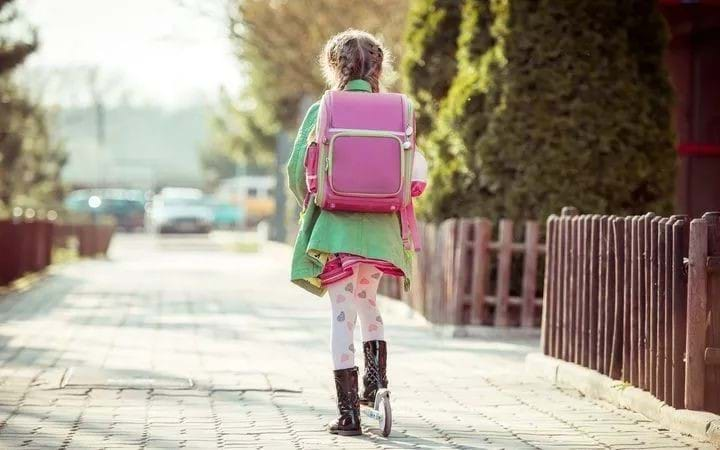
Judy said, “Lily was an outgoing kid. She was about two years old when we immigrated to New Zealand… She got along well with her classmates.”
“It was around 5pm when I returned home that day. Lily had locked herself in her room as usual. I knocked on her door, but she didn’t open it.”
“I didn’t notice that something wasn’t right…I went straight to the kitchen to prepare dinner.”
An hour later, after Judy had prepared dinner, she knocked Lily’s door but Lily didn’t respond. She opened Lily’s door and found the poor girl cowering in the corner of her room, her arms wrapped around her knees and her eyes red and swollen.
“I walked towards her and asked her what had happened. Lily jumped into my arms and burst out crying. She was really upset.”
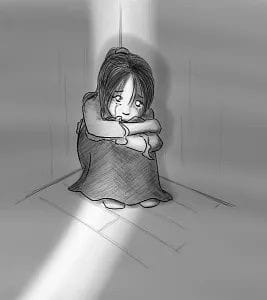
Judy held Lily in her arms and patted her back. “Don’t be afraid. Mum is here with you.”
Ten minutes later, after Lily calmed down, Judy found out what an awful day Lily had experienced.
“She told me that as soon as she sat down at her desk, she heard her classmates whispering beside her. ‘Keep away from her; she’s got the Asian virus!’; and in the afternoon, another student ran up to her and shouted, ‘Don’t come to school! Take your corona virus back home!’”
After hearing Lily’s words, Judy was heavy-hearted. “My child should not be treated like this. This is intolerable!”
She called the school immediately expecting that they would take it seriously and take measures to protect her daughter.
“Lily told me she didn’t want to go to school the next morning. I told her that I had reported what happened to the school and that the school will stop the ‘bad’ classmates from harassing her like this again.”
Judy finally persuaded Lily to go to school again, but when she was there, she was again subjected to yelling and harassment by some of her classmates. It appeared that the school had done nothing to prevent the racial harassment.
As soon as Judy heard about it, she brought Lily back home and tried contacting the school but received no reply.
On the third morning, Lily firmly refused to go to school anymore. Judy agreed. “Under these circumstances, I will not let my daughter be exposed to danger. The school should be expected to provide a safe environment for all the children.”
Over the next three days, Judy called, emailed and messaged the school, but received no adequate response outlining how the school would address the issue. “I could not let my daughter study under the threat of racial harassment. I had her transferred to another school two weeks after this incident.”
“Is it my fault? Why did they do this to me?”
These two questions are what Lily asked the most.
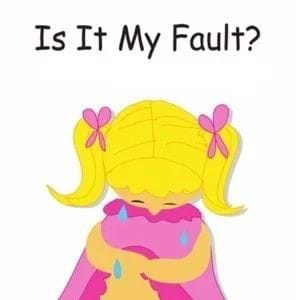
On May 3rd, 2020, Meng Foon, Race Relations Commissioner, was interviewed by Radio NZ. In the interview, he reported a spike of racism cases during COVID-19. Over two hundred and fifty human rights violation cases were reported within one month’s time of the COVID-19 pandemic (from the end of March to early May). Eighty-two cases were linked to racial harassment. Of the racial harassment cases, 30% were related to Chinese and other East Asians; 28% targeted Muslims and 14% Indians; 5% of the racist cases were Māori or Pacifica related.
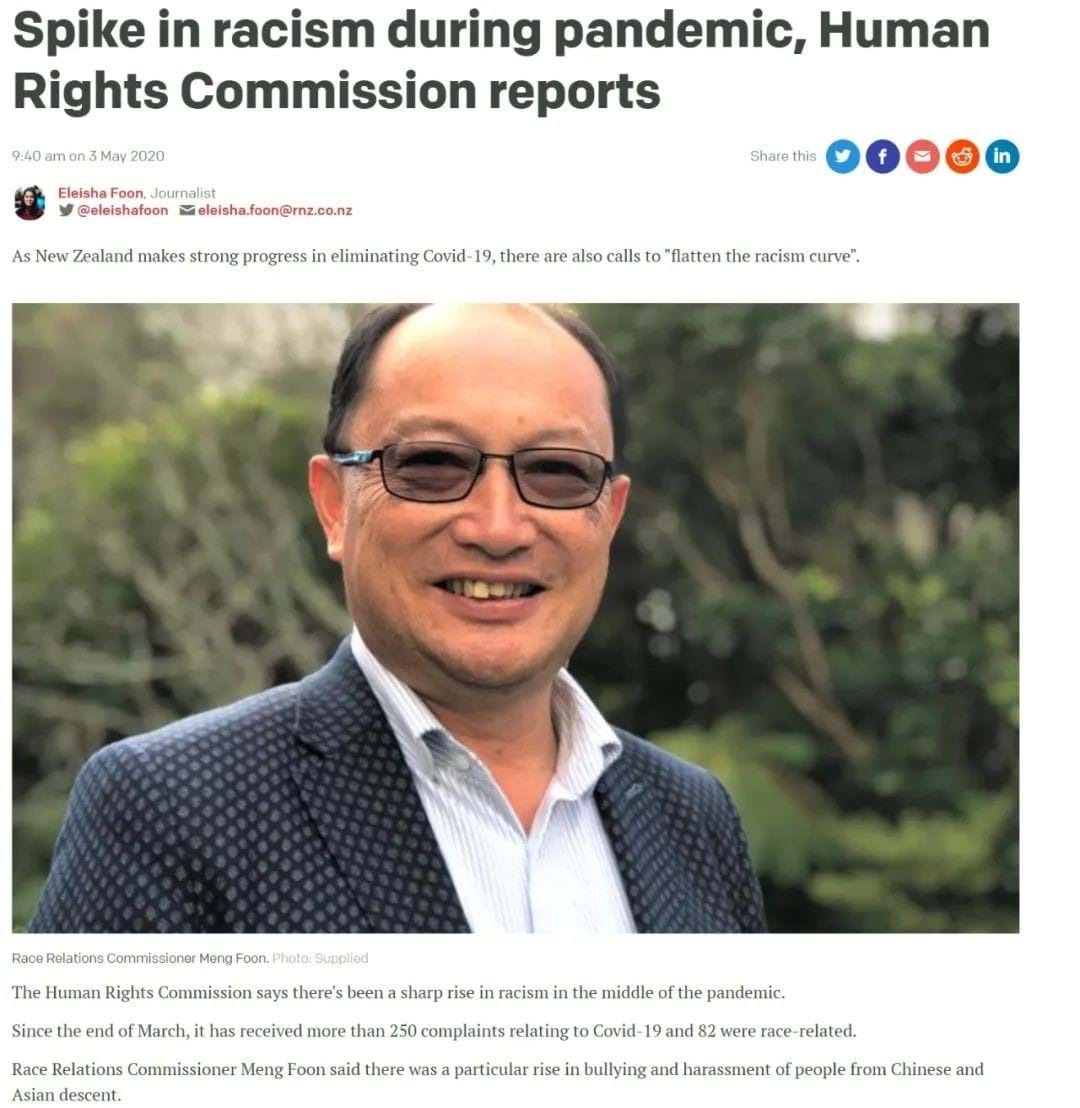
Source: RNZ website
On the Human Rights Commission website, Kelly Feng, the national director of Asian Family Services (AFS), also talked about mental health support cases related to racism that AFS received in the middle of the COVID-19 pandemic, including Lily’s case mentioned above.

Source: HRC website
When it comes to the spike in racism cases targeting Chinese and Asians in New Zealand, Meng Foon reiterated that the New Zealand Government shows no tolerance towards racial discrimination— “We give nothing to racism.”
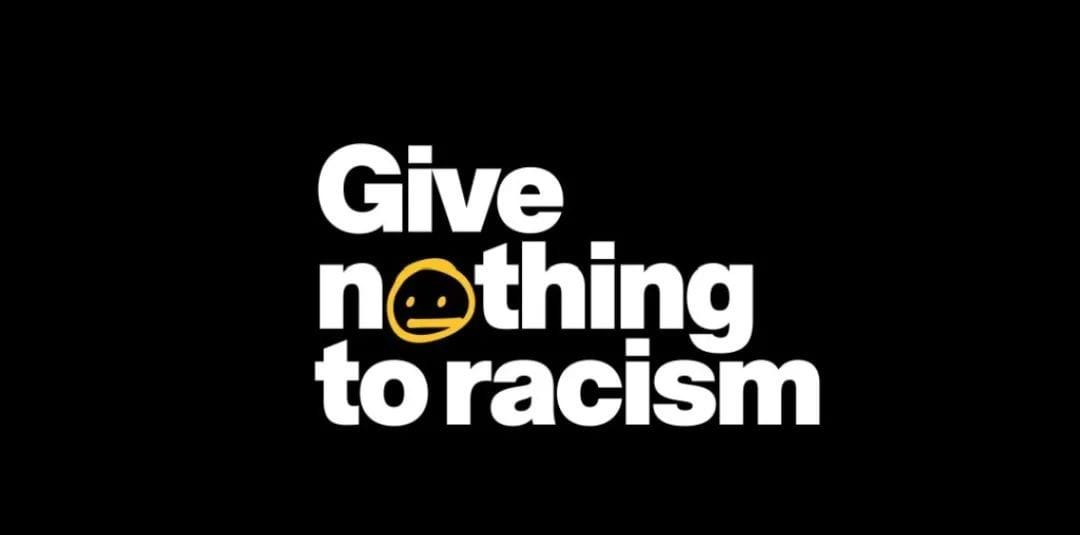
He also suggested that the current data might understate the actual racism situation.
“According to traditional Asian values, most Asians will choose to keep their mouth shut when treated unfairly. This is an issue that New Zealand society should pay closer attention to.”

Source: RNZ website
Everyone has the right to be treated fairly!
Everyone has the right to be free from racial discrimination.
You don’t have to put up with racism! Be brave and ask for help!
If you have encountered racial discrimination in New Zealand, how do you get help and support? Let’s take a look at relevant information provided by the Human Rights Commission of New Zealand.

Source: HRC website
1- What is racial harassment?
Racial harassment is behaviour that is racist, hurtful or offensive and is either repeated or serious enough to have a harmful effect on you. Racial harassment can involve spoken, written or visual material or a physical act.
2- On what occasion is racial harassment unlawful?
The Human Rights Act makes racial harassment unlawful when it occurs in:
-government or state sector activities, including public education and health services
-employment
-business partnerships
-industrial and professional associations
-qualifying bodies and vocational training bodies
-access to public places, vehicles and facilities
-access to goods and services
-access to land, housing and accommodation
-access to education.
3- Examples of racial harassment
Racial harassment can involve spoken, written or visual material or a physical act. You may have been racially harassed if someone:
-makes offensive remarks or jokes about your race, colour, ethnicity or nationality
-mimics the way you speak, e.g. if you have an accent
-calls you racist names
-shows you racially offensive material in the workplace
-deliberately mispronounces your name.
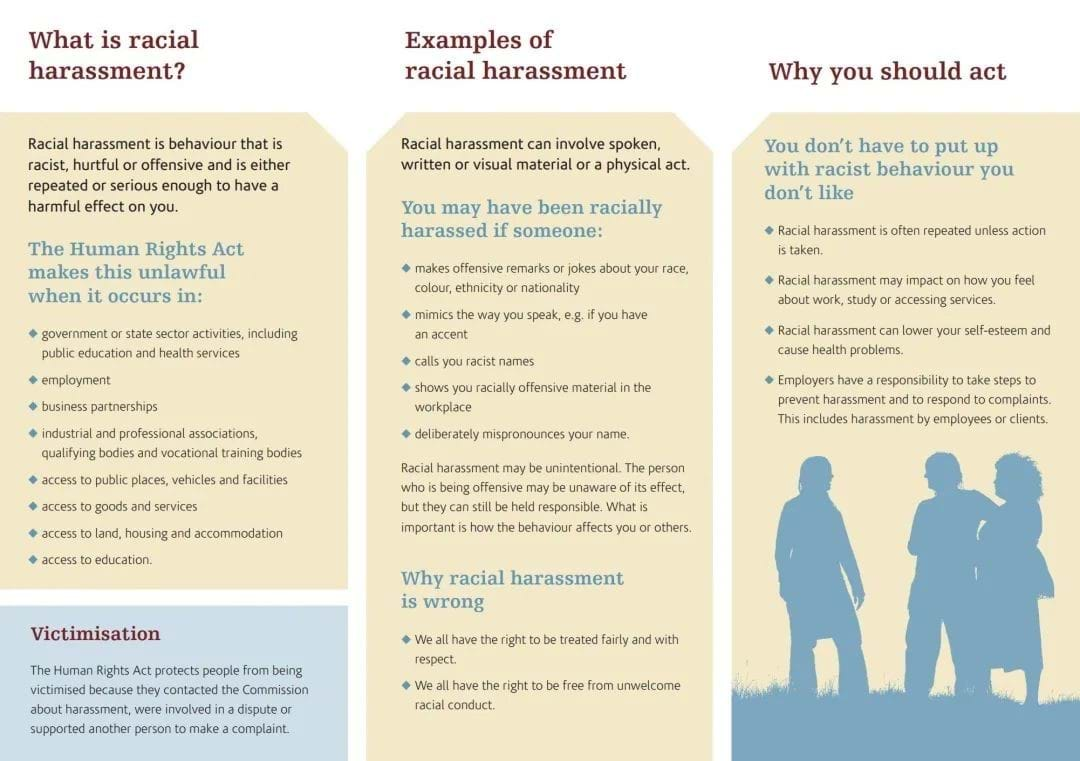
source: HRC website
Racial harassment may be unintentional. The person who is being offensive may be unaware of its effect, but they can still be held responsible. What is important is how the behaviour affects you or others.
4- Why racial discrimination is wrong?
We all have the right to be treated fairly;
We all have the right to be free from unwelcome racial discrimination.
5- Why should you take action when racially discriminated against?
-If you do not take action, the racial discrimination is often repeated and the perpetrator will not stop;
-Racial discrimination may impact on how you feel about work, study or accessing services
-Racial discrimination may lower your self-esteem and cause health problems.
6- What can you do about racial harassment?
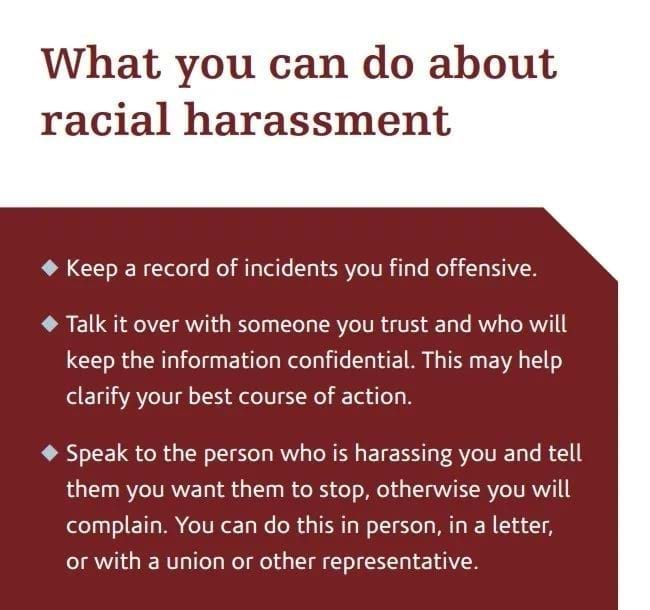
-Keep a record of incidents you find offensive.
-Talk it over with someone you trust who will keep the information confidential. This may help clarify your best course of action.
-Speak to the person who is harassing you and tell them you want them to stop, otherwise you will complain. You can do this in person, in a letter, or with a union or other representative.
If this doesn’t work or is inappropriate, you can seek advice and assistance from:
-a racial harassment contact person (many workplaces have a harassment policy)
-a manager or school counsellor
-the Human Rights Commission
-your union representative or a lawyer
-a professional disciplinary body
-the police
-the Employment Relations Service (if you have been harassed at work). Phone 0800 20 90 20.

7-What can you do if your family/friend/colleague has encountered racial discrimination?
The most important principle: Support-Record-Report
Support:
(1)Be by the side of the victim, show care about their wellbeing and tell them that they are not alone.
(2)The victim may have different emotional responses, such as fear, anger, embarrassment etc. Please keep them company and try to calm them down; do not just stand by and show an indifferent attitude.
Record:
(1)Use your mobile phone to record the process of how they were racially harassed if possible; this would be helpful to find the perpetuator.
(2)Record the details of the incident (such as time, place, the process); Please be as detailed as possible.
Report:
(1)Report to related government department;
(2)Call the police;
(3)If the incident occurs on public transport, please tell the bus driver, train conductor or other passengers of this. Please do not pretend not to listen or to see.
How to report a racial harassment case to the Human Rights Commission?
1-Telephone: 0800-496877(toll free)
2-Email: [email protected]
3-Short message: 021 0236 4253
4-Fax:09 377 3593
5-Website: https://www.hrc.co.nz (please copy the website link to a browser and open)
Special Tips:
If you call to report a case, you can ask for an interpreting service to facilitate your communication.
If you verbally report a case (via email, website or messaging), you can describe your experience of being harassed in your own language. The NZ Human Rights Commission will process this and contact you later.
Impacts of racial harassment on mental health
When people encounter racial harassment, their mental health may be affected in different ways.
Some may feel fearful toward society, fearful of going out or going to work/school or using public transport. Some may experience doubt about themselves, having low self-worth and a strong sense of inferiority.
The 12-year-old girl Lily mentioned in the above case, had a strong resistance to going to school because of insecurity caused by the racial abuse incident. She also doubted herself, which was reflected in the question she asked her mother - “Mom, what have I done wrong?”
Please remember:
It is never your fault that you were racially harassed!
Please do not keep silent!
Use legal actions to protect yourself!
On June 19th, 2020, AFS will host a webinar via Zoom to advocate “Give nothing to racism.”
If you have encountered racial discrimination in New Zealand, or have been unfairly treated and are willing to share your experience with us, please feel free to join our event by scanning the QR code below:

Last week, Ivan Yeo, the deputy director of Asian Family Services, talked about issues related to racial discrimination when he was interviewed by WTV. Please click the video link below to watch.
If you have been racially harassed and need some help and support,
please contact Asian Family Services,
improving the mental wellbeing of Asians in New Zealand.
AFS is, and will always, be with you.
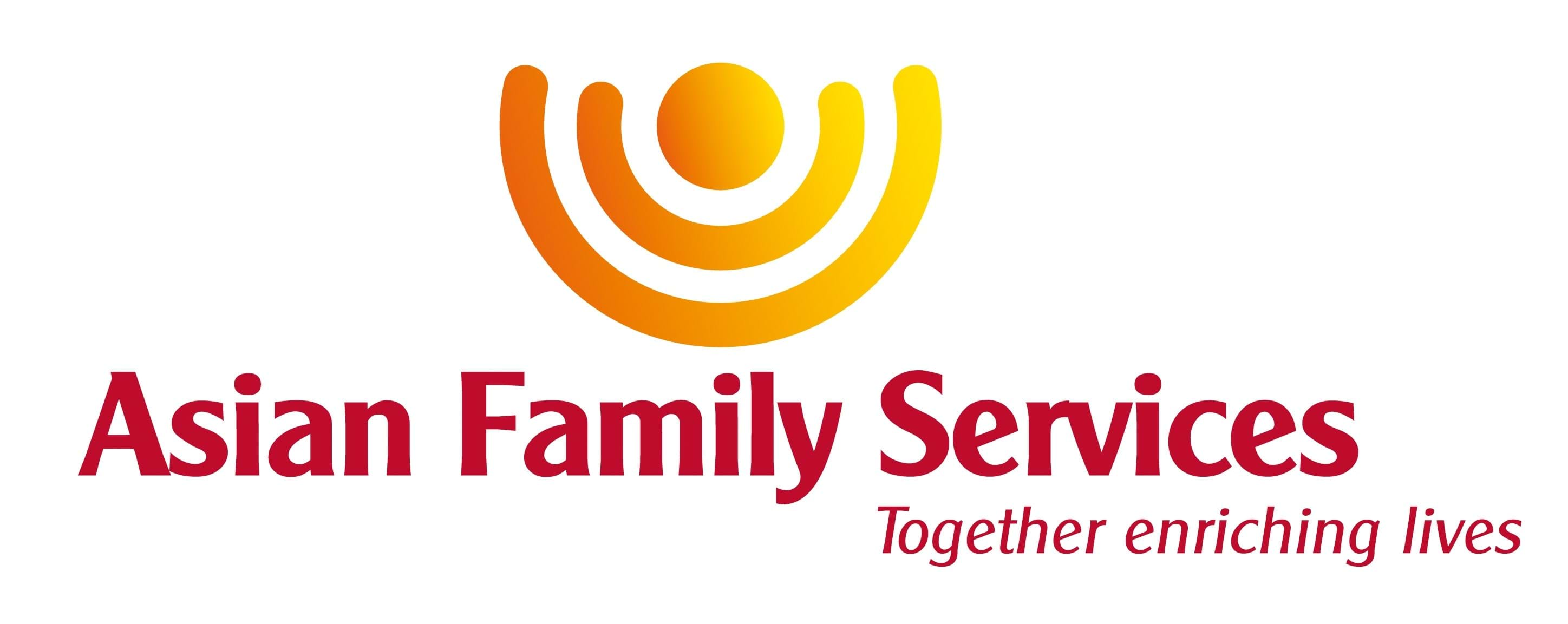
Call free on our Asian Helpline
0800 862 342
(Helpline hours: 9am to 8pm, Monday to Friday)
AFS provides counselling services in eight languages, including English, Mandarin, Cantonese, Korean, Japanese, Vietnamese, Thai and Hindi.